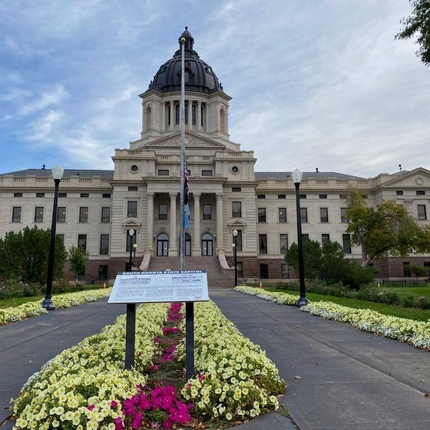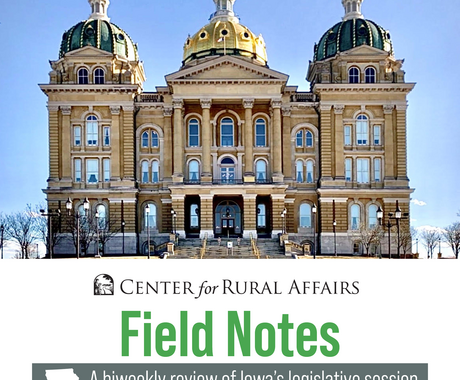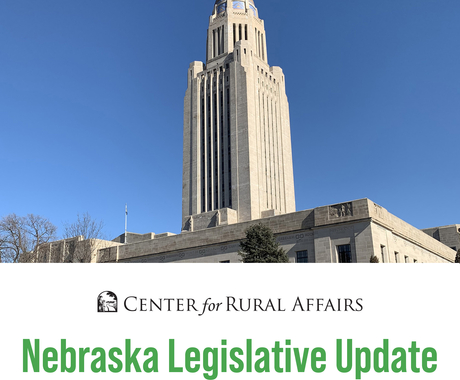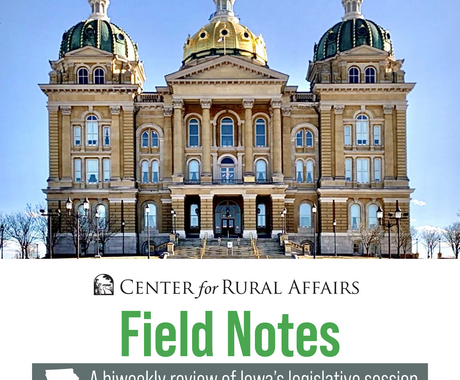Today is Day 26 (of 37) of South Dakota’s Legislative Session.
The Legislative session is heating up as “crossover” day is this week, meaning bills must pass out of their house of origin.
All bills must pass out of both houses by March 9.
Economic development
Senate Bill 157 (brought at request of the Governor) Oppose → revises certain provisions regarding the county zoning and appeals process.
SB 157 removes the requirement for a public hearing for special permits at the county level and limits the ability of the public to participate in the permitting process for concentrated animal feeding operations, wind energy developments, and other infrastructure and agricultural projects that would be built in their area. The Center opposes this legislation as it limits local control. We believe citizens should have the opportunity to weigh in on projects to be built in their area and express concerns or bring up important issues that should be addressed.
SB 157 was heard on Feb. 19 in the Senate State Affairs committee. The Center submitted comments in opposition to the bill. The two-hour hearing included testimony from many proponents and opponents and debate among the legislators. The bill passed 6-3 and was heard on the Senate floor on Feb. 21. It passed the floor with a vote of 24-11. The House committee hearing is not yet scheduled.
HB 1271 (Karr) Support→ Establish certain provisions regarding the rural broadband fund.
This bill would create a rural broadband fund in the state treasury that would provide grants to eligible applicants for the purpose of funding and installation of infrastructure that supports broadband service scalable to speeds contained in the most current FCC’s definition of broadband.
This bill has been referred to the House Commerce and Energy Committee. A hearing has been set for 10 a.m. Feb. 26.
Energy and environment
SB 111 (Wiik) Support → excludes certain wind energy tax revenue from the state aid to education formula.
SB 111 changes the formula used to determine wind energy tax revenue for school districts in counties where wind energy projects are hosted. The bill would cap the amount of revenue from wind energy that would be considered as a county’s local effort for the purposes of determining state aid for education.
Passed 5-2 in the Senate Taxation Committee on Feb. 10 but failed to pass the Senate floor with a vote of 12-22.
SB 85 (Rusch) Neutral → establish an annual fee for certain electric motor vehicles and electric hybrid motor vehicles.
SB 85 creates an annual fee of $100 for electric motor vehicles and $50 for electric hybrid vehicles. The purpose of this bill is to offset the lost funds that are normally generated by the gas tax and collected in the state’s highway maintenance fund.
The Senate Transportation Committee had a hearing on this bill on Feb. 7 and was sent to the 41st day (killed) with a vote of 5-2.
SB 165 (Steinhauer) Support → require all wind energy facilities to include an aircraft detection lighting system.
Last year, the legislature passed a law requiring all wind energy facilities to include an aircraft detection lighting system. SB 165 would amend this law to allow—until 2024— for wind energy facilities permitted before July 2, 2019 to comply with the requirement.
This bill was heard in Senate Commerce and Energy on Feb. 20 and sent to the 41st day (killed) with a vote of 6-1.
Food and agriculture
HB 1125 (York) Support → revise conditions for selling non-temperature-controlled baked goods without license.
HB 1125 amends South Dakota’s “Home Processed Foods Law,” which allows for the sale of non-temperature controlled baked goods without a license. The bill makes several changes. The most beneficial would be the removal of the $5,000 gross sales cap. The bill also allows sellers to apply for an ID number for their product label instead of listing their personal information. The bill has been referred to the House Commerce and Energy Committee.
This bill was heard Feb. 19 in the House Commerce and Energy committee. It was amended for clarification regarding the ID label number language and passed unopposed. It passed the House floor unopposed on Feb. 21.
HB 1008 (Qualm) Support → legalizes the growth and production of industrial hemp and derivative products in the state, and to declare an emergency.
HB 1008 was heard in the House Agriculture and Natural Resources Committee on Feb. 6 and passed without opposition 11-0. It passed the House floor on Feb. 12 with a vote of 54-12 and is scheduled for a hearing in the Senate Agriculture and Natural Resources Committee on Feb. 25.
HB 1006 (Chaffee) Support → authorizes the secretary of revenue to contract with certain entities for purpose of maintaining a database to determine agricultural income value and to specify the mandatory and permissive data of the database.
HB 1006 has been brought at the request of Agricultural Land Assessment Implementation and Oversight Advisory Task Force. The purpose of the bill is to allow the state to utilize a wide range of agencies to gather information on different types of agriculture with the intent to build a broader database and increase data accuracy, especially in regard to non-cropland. Proponents of the bill include the Dept. of Revenue, SD Stockgrowers Association, Farm Bureau, SD Cattlemen's Association, and SD Chamber of Commerce.
HB 1006 passed both houses with little to no opposition and was signed by the Governor on Feb. 19.
HB 1007 (Chaffee) Support → requires certain adjustments to the assessed value of agricultural land, if factors impact the land's productivity and require those adjustments to be documented.
HB 1007 has been brought at the request of the Agricultural Land Assessment Implementation and Oversight Advisory Task Force. The purpose of the bill is to create a uniform process for land owners to request a piece of land be reassessed to reflect actual productivity. It also requires the assessors to document the request, investigation, findings, and reasoning for their decision. Proponents of the bill include SD Stockgrowers Association, SD Conservation Districts, Farm Bureau, SD Association of Cooperatives, and SD Cattlemen's Association.
The bill passed both the House and senate with no opposition and is headed to the Governor’s desk.
SB 76 (Russell) Support → to provide for the assessment of certain agricultural land as noncropland.
SB 76 allows for any agricultural land which has been seeded to grass for at least 10 years and is used for animal grazing or left unharvested or is native grassland, to be categorized as non cropland for assessment purposes.
SB 76 was heard in the Senate Taxation committee on Feb. 12 and was sent to the 41st day (killed) with a vote of 4-3.
We welcome your input. Feel free to be in touch about these or any other bills you feel are important to rural communities.





